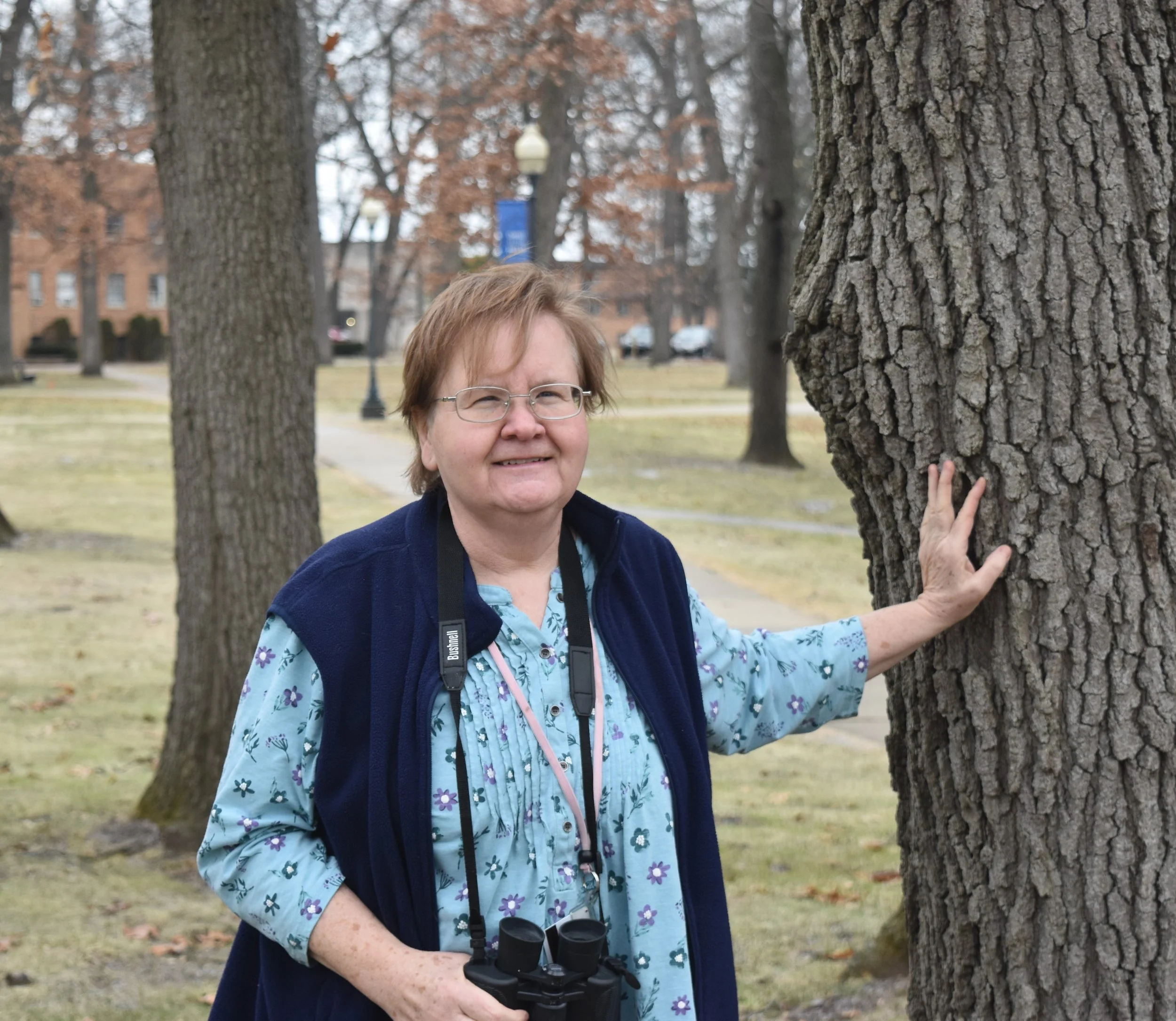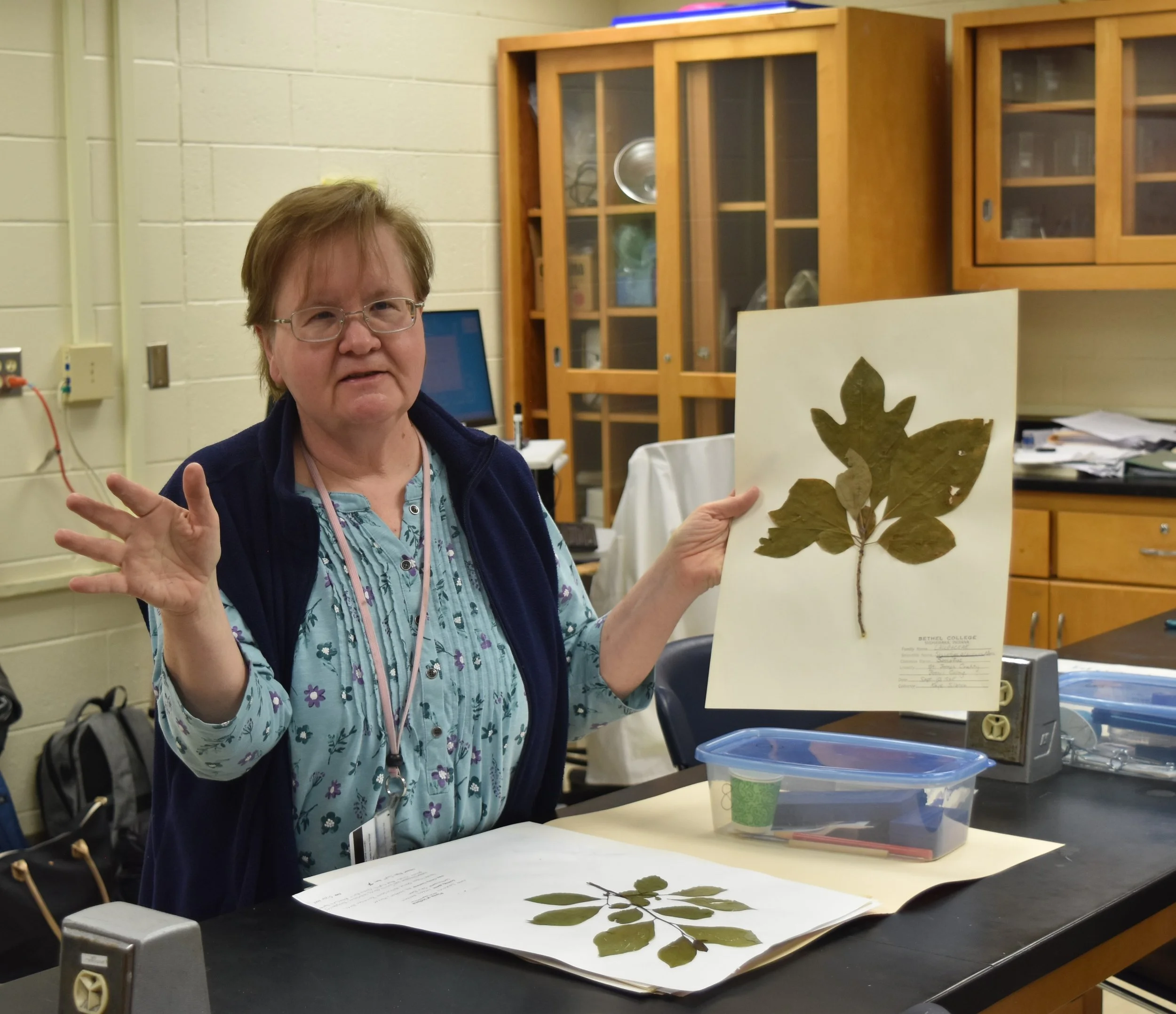FACULTY Q&A WITH WILDLIFE BIOLOGIST DR. KATIE WEAKLAND
Katie Weakland is the Department Chair and Associate Professor of Biology at Bethel University in Indiana, where she teaches courses including General Biology, Botany, Zoology, Ecology, and Environmental Science. She has been teaching at Bethel since 2004, with several years in between doing development work in Tajikistan and teaching at Spring Arbor University. She serves as Au Sable’s faculty representative at Bethel.
How did you get into studying wildlife?
When I was a child, my older sister bought our family a subscription to Ranger Rick Magazine, published by the National Wildlife Federation. I really liked science, hiking, being out on the water. It’s something I’ve had a passion for since childhood.
You became a follower of Jesus at a national wildlife refuge in Maryland at age 26. Tell us more.
I had been raised in the Catholic Church but nothing really stuck with me. By the time I left Ohio State with my bachelor’s degree in Zoology I was really an agnostic. I believed there was a god but I was antagonistic towards him. I ended up at this national wildlife refuge for a three-month position after my master’s degree at Purdue.
Two of my coworkers were Christians, and one of them was a pretty strong evangelist. I fought them a lot. But the holy spirit started working on my heart. I started investigating what they said. I read the scriptures and was convinced that they were true and that Jesus was the truth. At one point I was looking out on a saltwater marsh and one of my coworkers asked, “What do you see out there?” We had this conversation and later that day I ended up accepting Christ.
Was it challenging to integrate your newfound faith with your vocation?
It was. After I had gone to Ohio State and Purdue, I was fairly convinced that most people in my field were atheist or agnostic. I always felt perhaps a little looked down on because I had a Christian faith in that field. Through InterVarsity Fellowship I was able to understand that you can integrate your Christian faith with your discipline and found people who shared my values.
While I was working with InterVarsity someone told me I could build up student leaders not just in the Christian faith but in my discipline, sending out leaders to care for creation. That really intrigued me. That’s how I ended up at a Christian college teaching in my discipline.
In the biology department, we don’t get a lot of students who want to go into zoology and ecology. The majority of our students are premeds.
Why do you think students tend to go toward medicine instead of the environmental disciplines?
I’ve actually talked to students about this. Many of them haven’t been exposed to the idea of doing research as a career. When they think of science they think of engineering or medicine. They also haven’t been exposed to the idea of creation care. I have done survey after survey in my courses. None of my students in 20 years of teaching have ever had a pastor preach about creation care. It’s not seen as valuable in the church. But becoming a doctor, nurse, or physician assistant is. It’s helping people.
Sounds like a challenging position to be in. What keeps you going?
I stay because of the classroom. I’m an extrovert. I love sharing my knowledge with students and have the light bulb turn on. I would love to see more students going into environmental stewardship, but I’m thankful for the ones I do have. I still love investing in the students who are thinking of medicine. That’s also a way of building the kingdom of God.
I’m often more proud of the students who have struggled academically or socially. I’ve been part of their journey to get that degree. They may not be going to grad school or med school, but the reward is seeing students walk across that stage.
What is your favorite course to teach and why?
Ecology. I have upperclassmen in that class. I get to do research with them and get them excited about asking questions and doing investigations.
What are you currently researching?
My background is looking at habitat modeling of different species and human impacts on that species. I’ve just started a project with a student on the Virgina Rail, this secretive marsh bird that is threatened in Indiana. We’re starting to think through some questions to ask about this species and think about what data would be helpful for wildlife managers to know to help this species increase its population size.
What would data collection for the Virginial Rail involve?
We would identify some wetlands where the bird might possibly be and get some surveys on them. We would use occupancy models and playback to determine if they’re there. You play the call of the bird and listen for them to call back. The males are pretty aggressive if they hear another male. We would compare different wetlands and habitat that is surrounding where those birds are found and try to make some models to predict where they might be.
You mentioned part of your vocation is discipling students in creation care. What does that look like?
One of the courses I teach is Environmental Science. It’s non-major’s class. I get a variety of students in there—business majors, elementary ed majors, ministry majors. This course is where I’m really trying to build momentum with students to think about how they themselves can live more sustainably and care about creation, but also how their church can do that. My devotions in that class start with, “What is creation care? Why should we care about the nonhuman creation?” I tell students, “What can you do in your church? Ask your pastor to do a sermon series. Ask if you could lead a Sunday school class. Ask if you could start a committee looking at the church’s resources. How could your church use this as a witness to your community?”
With the ministry majors, I tell them, “If you’re going to become a pastor, this is a major theme in scripture that’s been largely overlooked. Promise me that if you’re going to become a pastor and preach, you have to preach on creation at least once a year. You now know. You have a responsibility.”
“Promise me that if you’re going to become a pastor and preach, you have to preach on creation at least once a year. You now know. You have a responsibility.”
The other thing I tell them is, “I don’t know where you’re headed in the future. Some of you will have children. Some of you will end up being a state representative or senator. I want you to know certain things about creation if you’re going to be making laws, and all of you are going to be voting.”
I’ve had students tell me, “This class changed my life.” I have them do a sustainability project. They basically have to design a house based on a scenario I give them: “You’re married, two kids, this much money. What does that look like? What about your landscaping, your car?” That’s one way I get students motivated about this responsibility we have as humans to take over this role God has given us.
What do you hear from your students about their time at Au Sable?
I often hear students say that Au Sable changed their life. I often joke, “When you go to Au Sable, you don’t have to explain why you love salamanders or songbirds.” Students feel a sense of belonging for the first time in terms of their career choice.
Students always talk about the really cool things they get to see and do, like finding amphibians or endangered plants. They get really excited about the possibilities for their future.
What do you want students going into the environmental science field to know?
Students should take advantage of as many opportunities as they can to be outside the classroom. You learn so much when you do hands-on work. I highly recommend students look for internships, be research technicians.
Students should take advantage of the professors they have too. Don’t be shy. Go into the professor’s offices. Volunteer with them for a semester. Ask if you can do research with them.
For students in ecology, I recommend they take more math classes. This sounds crazy, but we use calculus and statistics. We apply that to population dynamics. Take computer courses. Take the “Ecological Analysis in R” course that Au Sable offers. That’s what science is—collecting data, organizing data, and understanding the statistics you’re using.
Read scientific papers. Students come to university and they have no idea what scientific writing is. Student should also do the Undergraduate Research Program at Au Sable if they have an opportunity. That just looks so good if you’re applying to grad school or looking for a job.
Anything else you’d like to share?
I don’t know that I’ve worked with finer people than the people at Au Sable. They have always been so supportive and encouraging to the faculty at affiliated institutions. They roll out the red carpet when we go up there for the Academic Council meetings. Au Sable has really blessed my own professional development, providing ways to interact with faculty that teach the same things and great ideas for incorporating creation care into our courses. The Au Sable staff know how to build community, love our students, and invest in our students.


